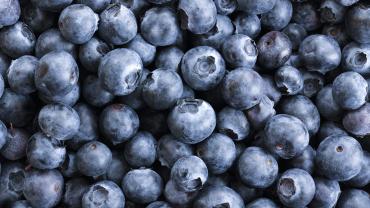
Redox balance, or the balance between pro-oxidant and antioxidant molecules, performs an important role in overall health and function. Free radicals such as reactive oxygen species are natural byproducts of many cellular processes involving oxidation-reduction reactions, including energy production. Among their physiological roles, reactive oxygen species act as signaling molecules. However, excess free radicals may damage cells, contributing to chronic inflammation and dysfunction. This may increase the risk of developing diseases, such as cardiovascular disease, diabetes, cancer, and Alzheimer’s disease. Research highlights the potential of promoting redox balance by consuming a diet rich in phytochemicals with antioxidant properties.
Blueberries contain many phytonutrients (such as anthocyanins, polyphenols, chlorogenic acid, epicatechin, and phenolics) that may have health-promoting benefits, including the support of redox balance. Anthocyanins are part of the flavonoid family. Blueberries have a high content of anthocyanins, with the potential for anthocyanins to make up almost half of the total polyphenol content. Anthocyanins and other polyphenols are potent scavengers of free radicals with the capacity to donate a proton to a free radical. They can also directly remove some oxygen species that may be a part of free radicals to create a less reactive molecule. Anthocyanins and other flavonoids may also donate hydrogen atoms to the peroxyl radical to interrupt the chain reaction of the free radicals.
Additionally, anthocyanins increase the body’s antioxidant defenses, including the increase of the enzyme superoxide dismutase, which catalyzes superoxide radicals into oxygen and hydrogen peroxide to create a less reactive molecule. They may also stimulate the nuclear factor erythroid 2-related factor (Nrf2) pathway, which is the main endogenous regulator of the body’s antioxidant defenses and redox balance.
Clinical studies demonstrate the potential for including blueberries in the diet to support antioxidant status in the body. In a double-blind, randomized, placebo-controlled trial, 27 participants with metabolic syndrome (a condition associated with increased oxidative stress and inflammation) consumed either a blueberry smoothie containing 22.5 g of freeze-dried blueberries or a placebo smoothie twice daily for 6 weeks. The researchers examined the impact on oxidative stress in immune cells, including monocytes and dendritic cells. Those who consumed the blueberry smoothies had a significant reduction in superoxide and total reactive oxygen species in the whole blood and monocytes compared to the placebo group. There was also a reduction in inflammatory markers, including tumor necrosis factor-alpha (TNF-α) compared to the placebo.
A cross-over design study of 18 male participants with cardiovascular risk factors compared the consumption of 25 g of a freeze-dried powder of wild blueberry that contained 375 mg of anthocyanins to a placebo for 6 weeks. Researchers found that consuming the wild blueberry drink led to a significant reduction in endogenously oxidized DNA and H2O2-induced DNA damage compared to the placebo, demonstrating the potential to reduce oxidative stress and associated damage.
Diet and lifestyle factors influence many factors of health, including redox balance. Adding phytonutrient-rich foods (such as blueberries) to the diet may support the body’s antioxidant status to promote redox balance.*
By Kendra Whitmire, MS, CNS